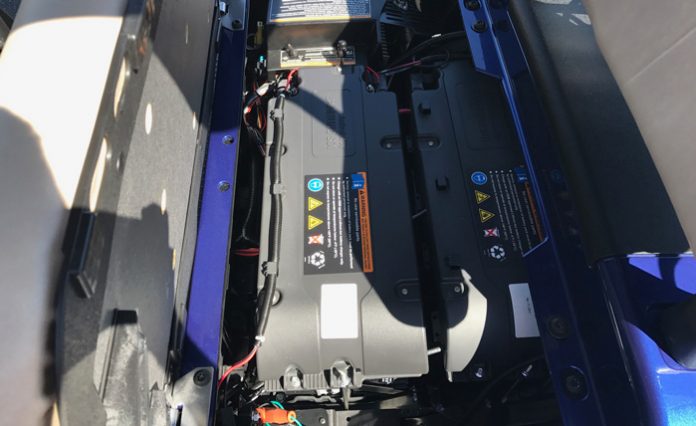
Lithium-ion Batteries
Lithium-ion batteries have become immensely popular these days. They are most commonly used in cell phones, but due to their exceptional features, they have now become popular to be used in golf carts as well. Let’s have a look at a complete understanding of how lithium-ion batteries work and their respective pros and cons.
How do Lithium-ion Batteries work?
A lithium-ion battery is composed of power-generating compartments known as cells. A cell has three components: negative electrode, a positive electrode, and an electrolyte. The third component, an electrolyte, is basically a chemical in between both the other components. When the lithium-ion battery is charging, some of the lithium ions move from the positive electrode through the electrolyte to the negative electrodes. During this process, the battery takes in the energy and stores it. The ions move back to the positive electrode when the battery is discharging. This results in the production of energy which powers the battery.
Pros of Lithium-Ion Batteries
The biggest benefit of lithium-ion batteries come in the form of their longer life. Unlike the traditional lead-acid golf cart batteries, which have an average of 500 charge cycles, a lithium-ion battery has the ability to reach a peak of 5,000 charge cycles.
Traditional golf cart batteries require numerous amounts of maintenance for enhancing their shelf life. The same is NOT the case with lithium-ion batteries. They require little to no maintenance as they do not corrode. Moreover, there are no hassles of checking the fluid level or putting fluid in the batteries.
Lithium-ion batteries are smaller in size and lightweight as compared to the conventional lead-acid golf cart battery. However, despite their small size, they have a capacity to discharge faster as compared to other battery types.
Cons of Lithium-Ion Batteries
One of the major drawbacks that are associated with lithium-ion batteries is that they pose the risk of explosion. This happens when the lithium cells overheat and increases the risk of an explosion.
Another issue with the lithium-ion batteries is that you have to charge them more frequently. As discussed above, they do not require any maintenance, but the hassles of charging them so frequently can be a little troublesome.
Lithium-ion batteries are priced relatively higher than traditional golf cart batteries. They provide more utility as compared to conventional batteries but the price level can be four times higher.
4 Signs You Need to Replace Your Golf Cart Batteries
The Final Word
As discussed above, lithium-ion batteries are more compatible with mobile devices, however, the increased cycles of uses in addition to the limited maintenance makes them appealing. If you use your golf cart as a means for daily transportation though, be aware that your range may be significantly diminished with lithium-ion batteries. There is still some concern revolving around their overheating potential, however, technology continues to improve and the safety of lithium-ion batteries will continue to improve. You’ll have to decide for yourself whether or not the price is worth it.








Please date your articles. Anything tech related changes very quickly
I hadn鈥檛 considered this angle before. I鈥檒l be checking your other posts as well. This was very informative and practical.